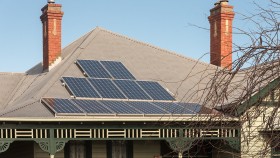Taking a holistic approach to the energy challenge
Rahul Ravindranathan moved to Australia from India to study the Master of Energy Change degree at ANU in 2018. With a background in electrical engineering and business administration, Rahul worked in the fields of energy consultancy and climate change mitigation in India and a number of other south-east Asian countries. After a career spanning seven years, Rahul began realising that it was not just the technical side that played a crucial role in his work.
In order to further his career, Rahul looked internationally for a course that would cover the policy, legal, and the economic aspects of energy. “In order to achieve a holistic approach to energy, I needed to gain knowledge in these other areas as well,” said Rahul. “Australia is one of very few countries to offer this multi-disciplinary approach and the Master of Energy Change degree was the best fit for my requirements.”
Rahul has embraced University life since arriving in Canberra in February this year. He is a member of the Postgraduate and Research Students’ Association and he is interning with the ANU to develop its Energy Master Plan – a research-led partnership of ANU expertise that will create a world-class, energy efficient, low carbon campus complete with its own electricity micro-grid. “Working on the ANU Energy Master Plan will help me implement some of my learnings at a practical level and understand better the potential hurdles and barriers involved,” said Rahul.
Rahul has some advice to offer those considering studying in the field of energy. “For those looking at the bigger picture with respect to overcoming the energy crisis that the world is facing, the Master of Energy Change degree is the right step for this transition. The degree gives you the flexibility to choose the type of courses you would like based on your professional goals and helps in filling in the knowledge gaps. Another benefit I hadn’t considered before starting my degree is how useful it is to interact with students from other countries and learn more about the energy situation in their home countries,” said Rahul.
On completion of the degree in 2019, Rahul hopes to work with government bodies or multi-national development agencies in developing suitable policies and projects to implement the switch from a fossil fuel based economy to a green and sustainable economy.
Find out more about the ANU Master of Energy Change degree.











